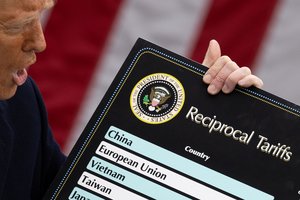In this video, Oonagh Fitzgerald, director of the International Law Research Program, sits down with Stephen de Boer, Canada’s Ambassador and Permanent Representative to the World Trade Organization (WTO), to discuss his role as International Gender Champion. They discuss how the 2017 Buenos Aires Declaration on Trade and Women’s Economic Empowerment has been received at the WTO and what challenges Mr. de Boer faces in this role.
The Importance of Women’s Economic Empowerment in World Trade
The Importance of Women’s Economic Empowerment in World Trade
[OONAGH FITZGERALD]
Stephen, I am so glad you could join us here at CIGI. It’s wonderful to have you back with us. I particularly wanted to have a conversation with you because of your work as the gender champion for the WTO.
[STEPHEN DE BOER]
That’s right. So there is a network of international gender champions; it’s an initiative where heads of organizations, heads of mission, are asked to become international gender champions, with a view to promoting gender equality within their organizations. And the thing that I find very exciting about it—and there is an excitement in Geneva about this as well—is that it’s the first time in the international gender champion process that the economic side is being brought into the discussion.
[OONAGH FITZGERALD]
You are raising issues that are perhaps a little challenging to the WTO, do you think?
[STEPHEN DE BOER]
Unfortunately, I have to say that it is a rather difficult conversation. Many people don’t see women’s economic empowerment as one of the “hard letter” issues, I suppose, for the WTO. They see it as being fairly esoteric and perhaps taking us away from what they would regard as more serious negotiations. So, one of my challenges is to point out that this is, when we talk about women’s economic empowerment, we’re talking about everyone winning, and everyone being able to access and take advantage of the trading system. So, I need to remind people of the significant economic benefits to doing this.
[OONAGH FITZGERALD]
How are we really going to get people to focus on those more concrete aspects of really getting at the ways to bring women into trade and get the data to explain how trade impacts on women?
[STEPHEN DE BOER]
Well, I think it’s going to be, unfortunately, I think it’s going to be a revolution as much as I think it’s going to be an iterative process. We are going to need to, I think, have case studies. We’re going to need to show what some of these policies have done in the past, and how they’ve discriminated, or how policy design actually prove to be beneficial. I think one of the challenges is to look within our own systems and point out where there is inequality, and where there are policies that promote that inequality. Because if we could do that, then we can stop being smug about what it is we’re doing internationally and say, “You know what, we all have issues.” So, we know, for example, that there’s pay differentials between males and females in Canada. Unless we have a good explanation for that, Canada needs to develop policy responses to reduce that difference. But that in itself, I think, is very valuable because it says, “You know what, we’re not done doing our work here in Canada. Surely we’re not done doing our work within the WTO context.”
For media inquiries, usage rights or other questions please contact CIGI.
The opinions expressed in this article/multimedia are those of the author(s) and do not necessarily reflect the views of CIGI or its Board of Directors.


